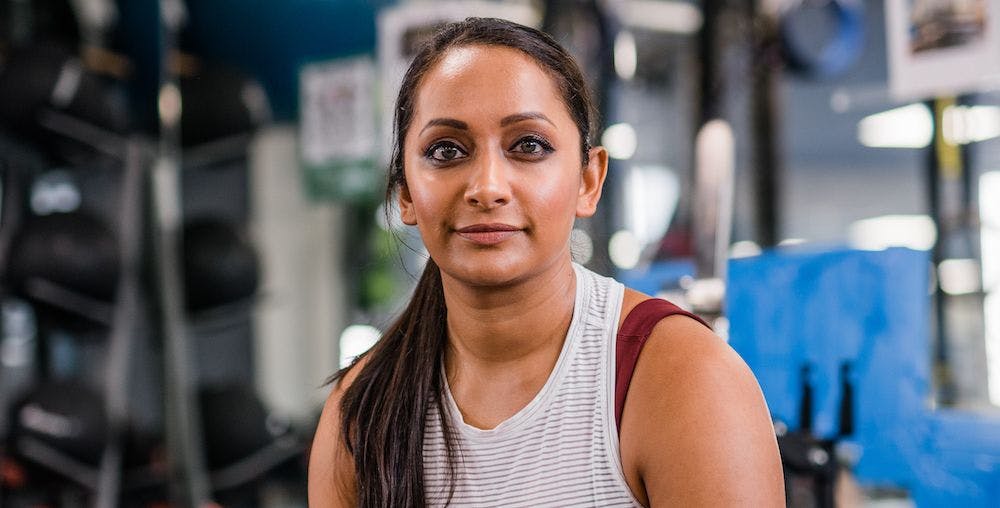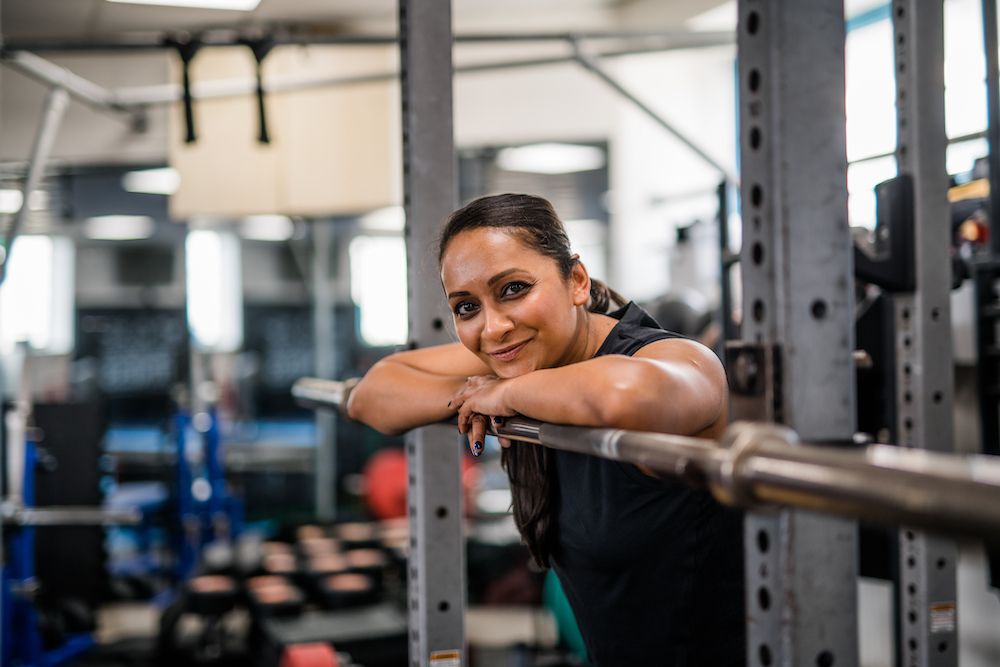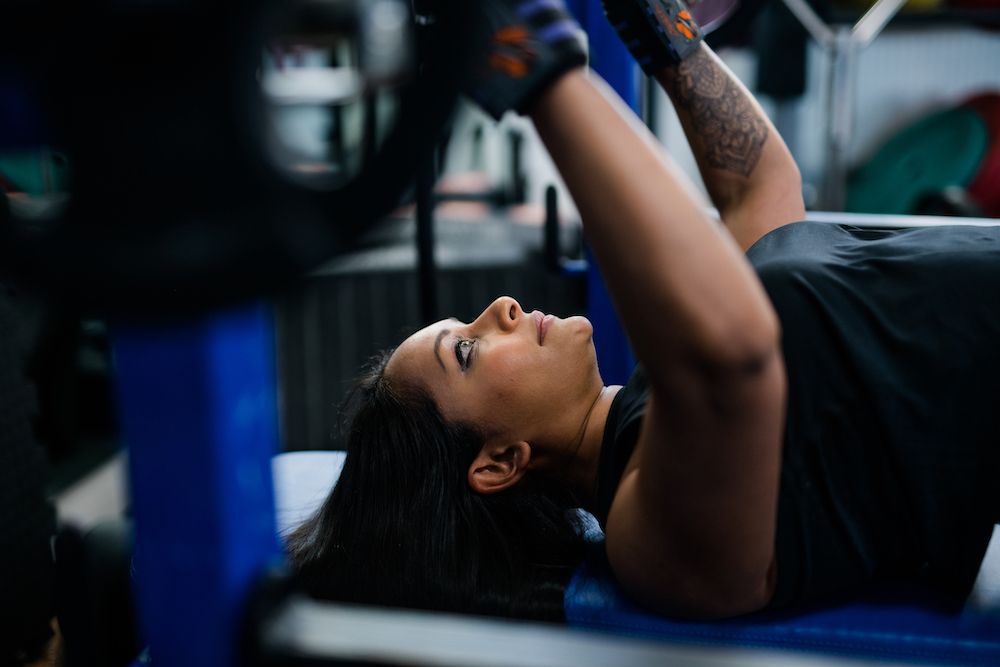
Journalist, award-winning writer, and competitive amateur powerlifter Poorna Bell shares her own journey to ‘strong’, and why it’s so important to embrace gratitude and abundance when they appear in your life
What does the concept of strong mean to you? Is it being able to easily move furniture, lift weights, run a marathon, stay on course when the world around you seems to be falling apart – or something completely different?
Right now, Poorna Bell is challenging us all to think about what strength means to us as individuals, and to tap in to what we love doing and what makes us feel powerful, ready, and safe within the world we inhabit. Her latest book, Stronger: Changing Everything I Knew About Women’s Strength, described as part-memoir, part-manifesto, covers a multitude of topics around women’s strength and fitness – importantly, with zero focus on weight loss. It homes in on personal circumstances, choice, societal influences, empowerment, as well as finding your own kind of strength.
“I imagine the book to be a power cable,” Poorna says, smiling. “It has a plug at the end of it, but it’s not yet attached to the power source. It’s about taking that plug, attaching it, and flicking the switch on.”

Photography | Aline Aronsky
The impetus for writing Stronger, she explains, came from taking up powerlifting. Poorna started her new practice at the age of 38, and she’s now a competitive amateur power-lifter, who can lift more than twice her body weight. However, her latest offering is about so much more than gaining physical strength and fitness.
“It covers a whole spectrum of experiences, from girlhood and being a really small child, through to women in their 20s, 30s, 40s and beyond,” Poorna says. “It explores subjects like periods, menopause, and looks at other intersectionalities within that; parenthood, different races, different abilities – hidden disabilities or visible – mental health, and celebrating every single body size, and what your body is capable of.”
And Poorna’s own capabilities are vast. As well as excelling at powerlifting, she’s a journalist, award-winning writer, public speaker, and mental health advocate, who has used her past life experiences, including the death of her husband Rob, to start conversations about suicide, grief, and recovery. Over the last year, she’s also dealt with the impact of long Covid and, as she happily reveals, she’s embarked on writing a fiction novel, which will be released in 2022.
"It isn’t because of a thunderbolt moment, it’s the accumulation of making a decision to be here every single day"
It seems that strength, for Poorna, is about acknowledging life experiences that shake but don’t break us, continually working on ourselves physically and mentally, perseverance, and focusing on our own goals – for our own personal versions of success.
Here, she shares some of the lessons she learned along the way to her version of strong, and the importance of acknowledging moments of happiness and accomplishment.
Embrace abundance and gratitude when they appear in your life
I feel like a sunbeam at the moment! It’s taken a lot of inner work though, to enjoy that feeling of being grateful and noticing an abundance of good, rather than looking to the past or future and thinking: ‘When is this going to change?’ Life is a rollercoaster, as we all know, and things will change, but we don’t have to hasten that.
Be ‘in the moment’
For the majority of the past year, I had long Covid. I was ill for around 10 months. I started to get better at the end of January, and the gratitude I feel for being able to do more, sit in the moment, and not over-analyse it, brings me a lot of joy.
Now, when I visualise my future, it’s like looking down a long corridor and all the lights are on. That doesn’t mean that unforeseen things won’t happen along the road, but it just feels like this is ‘the moment’ for me.
Movement can teach us valuable life lessons
I love paddleboarding; it’s such a metaphor for life! Everyone who tries paddleboarding for the first time is so focused on not falling in, that they fall in. They’re not focused on the horizon, which is what they need to be looking to. You have to keep your head straight, you have to keep looking forward.

Photography | Aline Aronsky
Know that work is always going on ‘behind the scenes’
When you work in the mental health space, and you regularly talk about the subject, people assume you have it all together. I don’t think they understand that there’s still a lot of work going on ‘behind the scenes’ with your own mental health, but also that the reason you’re able to talk is because you’ve had to do a lot of that work already. It takes time.
Find the strength to say no
Before Covid, I became really unhappy with having my calendar booked out, and not having time for spontaneity. Also, there’s the irritation of social jenga when people cancel on you!
On the flip side, I noticed that when people did cancel, I was mostly relieved. It was at that point I realised I needed to check in with myself. It took some time and personal strength to tell people, but I stopped booking events in my diary weeks in advance because I’m not going to know how I’m going to feel, physically or mentally, in four weeks’ time. I don’t have a crystal ball!
"Life is a rollercoaster, as we all know, and things will change, but we don’t have to hasten that"
Pursue your goals, relentlessly
I always wanted to write fiction, I was just really bad at it! In my 20s I started so many books and they were horrendous, I can’t bring myself to read them. The motivation for starting each was to write something that people would think was clever and creative, and that’s a terrible motivation because you’re then writing something completely artificial.
When we went into the first lockdown, creative writing became something I’d do at the end of the day as a little treat to myself. And because it wasn’t for anyone or any specific purpose, it became one of my most enjoyable things to do. I was taking it right back to writing for the joy of writing.
You can emerge stronger after grief
There are lots of different types of grief. The grief I feel the most is for the part of me that was married to Rob that just wasn’t there anymore after he passed away. I still feel her, I remember her, and I really care for her.
I also know that the self that came through that experience is formidable, and can withstand so much. That isn’t because of any thunderbolt moment, it’s the accumulation of making a decision to be here every single day, to be a part of my loved ones’ lives, to go to work and feel the sun on my face.
‘Stronger: Changing Everything I Knew About Women’s Strength’ by Poorna Bell (bluebird books for life, £16.99) is out now.
Hero image | Photography: Aline Aronsky
To connect with a counsellor to discuss experiences of grief or ways to work on your own mental stength, visit counselling-directory.org.uk

